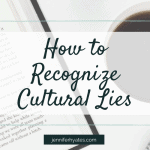How to Recognize Cultural Lies
Anybody can write a book, start a blog, or create a podcast–I am living proof of that fact. But it doesn’t mean they have truth for your life. Truth comes from God’s Word.
That said, lots of people can tell you what’s in God’s Word and be totally wrong, myself included. So if you get your theology from Facebook or Instagram, you might want to pay attention.
I want to talk to you today about what we as women really need and how to know if we are getting truth. But don’t take my word for it. Be like the Bereans and hold everything up to the Word (Acts 17:11).
How to Recognize Cultural Lies
I want to share some quotes that I took straight from the Amazon book descriptions of some best-selling Christian authors. I’m giving their names because I am quoting them, but my intent is to simply bring attention to the message not to criticize the messenger.
“…many women have been taught to define themselves through other people–whether as wife, mother, daughter, or employee–instead of learning how to own who they are and what they want. With a challenge to women everywhere to stop talking themselves out of their dreams, Hollis identifies the excuses to let go of, the behaviors to adopt, and the skills to acquire on the path to growth, confidence, and believing in yourself.”
Girl, Stop Apologizing by Rachel Hollis
I hope you can already see that while this message sounds good (because as Christian women we shouldn’t define ourselves through others) the answer is not to look within ourselves and “own who we are” but to look to Jesus, who called us to deny ourselves and follow Him (Matthew 16:24-26).
Subtle lies are still lies. How about this one:
“For many years, Glennon Doyle denied her own discontent. Then, while speaking at a conference, she looked at a woman across the room and fell instantly in love. Three words flooded her mind: There She Is. At first, Glennon assumed these words came to her from on high. But she soon realized they had come to her from within. This was her own voice—the one she had buried beneath decades of numbing addictions, cultural conditioning, and institutional allegiances. This was the voice of the girl she had been before the world told her who to be. Glennon decided to quit abandoning herself and to instead abandon the world’s expectations of her. She quit being good so she could be free. She quit pleasing and started living.”
Untamed by Glennon Doyle
Again, a “Christian self-help” book teaches that we should look within ourselves to define who we are and what is true, being willing to abandon the truth of God’s Word and listen to our own inner voice.
But Jesus teaches in the Word that His sheep listen to His voice.
“My sheep listen to my voice; I know them, and they follow me.”
John 10:27, NIV
Here’s another one:
“When you stop trying to force the Bible to be something it’s not–static, perspicacious, certain, absolute–then you’re free to revel in what it is: living, breathing, confounding, surprising, and yes, perhaps even magic.”
Inspired by Rachel Held Evans
I don’t know about you, but I had to look up perspicacious. It means “having a ready insight into and understanding of things.” Evans believed that the Bible is NOT certain, absolute, or able to give us insight and understanding.
Yes, it is living and active (Hebrews 4:12), but not in a way that means it changes. The Word of God is absolute and does gives us insight and understanding about God and about life.
“All Scripture is God-breathed and is useful for teaching, rebuking, correcting and training in righteousness, so that the man of God may be thoroughly equipped for every good work.”
2 Timothy 3:16
These are Christian books listed in Christian categories, and these women have thousands of followers. All three of them believe(d) that the Bible has either been misinterpreted or misunderstood about biblical womanhood, and that we need to be true to ourselves, our feelings, and our desires instead of holding to the “cultural conditioning” and “institutional allegiances” that have been the foundation of the Church.
Progressive Christianity
These ideas are coming out of a popular movement known as Progressive Christianity. It’s easier to live a message that tells us to believe in ourselves and our feelings and desires than it is to live out a message of self-denial and sacrifice. And many are following the wide road.
(Here’s a series on Progressive Christianity by Alisa Childers that I highly recommend.)
But if we want to follow Jesus, we must understand how to recognize a message that does not align with truth. We can only do that if we know truth, and that requires that we learn how to read and interpret the Bible, our source of truth.
Many women I talk to say that they know some Bible stories and verses, but they don’t really understand much of the Bible. They don’t share the Gospel because they are afraid they couldn’t answer people’s questions.
They know enough to be encouraged by the Word, but they don’t know how it all fits together or how to grow in their understanding.
And many don’t recognize when they are reading something that doesn’t align with truth. And that is dangerous.
Grow in the Word
I certainly don’t claim to have all the answers, and I would never tell anyone to just listen to me. Always go to the Word for yourself. But I have studied the historical and cultural context of the Bible, and I have taken seminary courses on how to interpret Scripture.
One of the ways I help women grow is by teaching the chronological, historical, and cultural context of the Bible. In my FOCUSED 15 Bible Study Club, I take women on an interactive journey through the Scriptures from Genesis to Revelation.
We explore the big picture view of the Bible by following the plan of redemption and how all the Bible fits together to tell one story of salvation for all mankind.
I believe this series is so important in today’s culture, because women need to know what it truly means to follow Jesus. In a world that is increasingly anti-Christian and “redefining” what it means to be a woman, I hope and pray that this series will take us all back to the Word where biblical womanhood is defined.
Jesus broke all the cultural expectations of His day and treated women better than His contemporaries did. And He defined our worth in Him alone.



